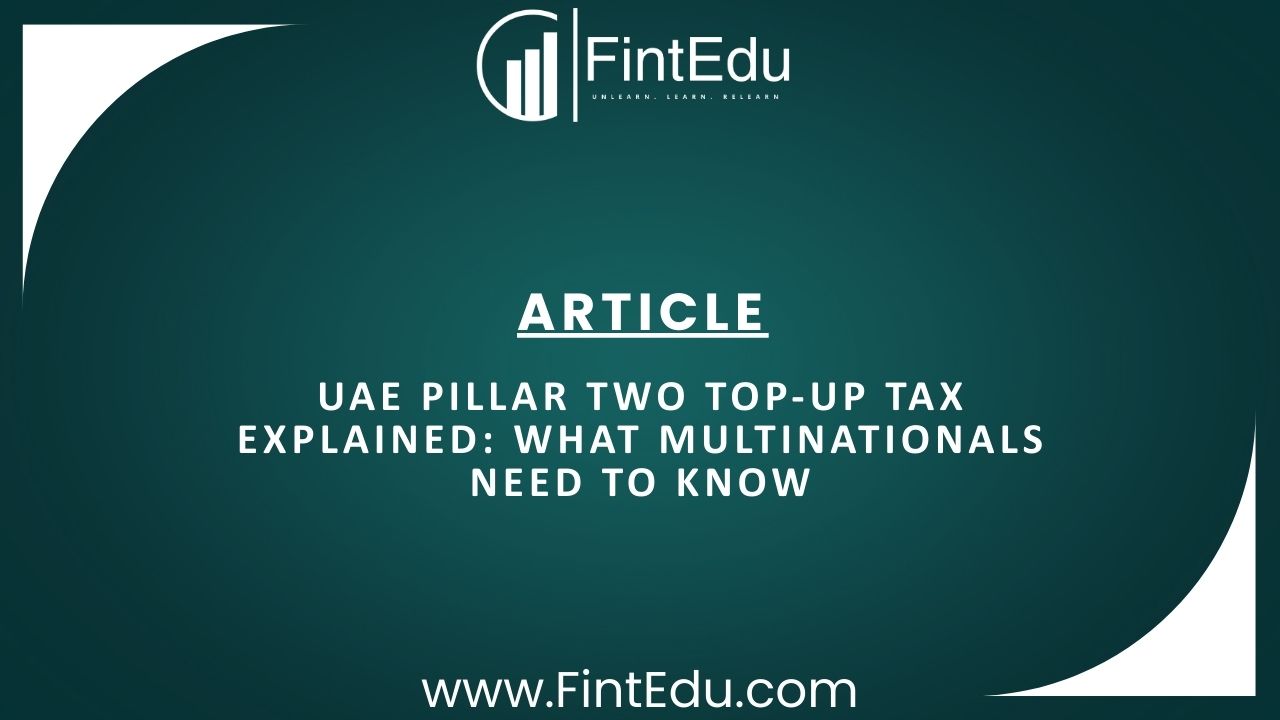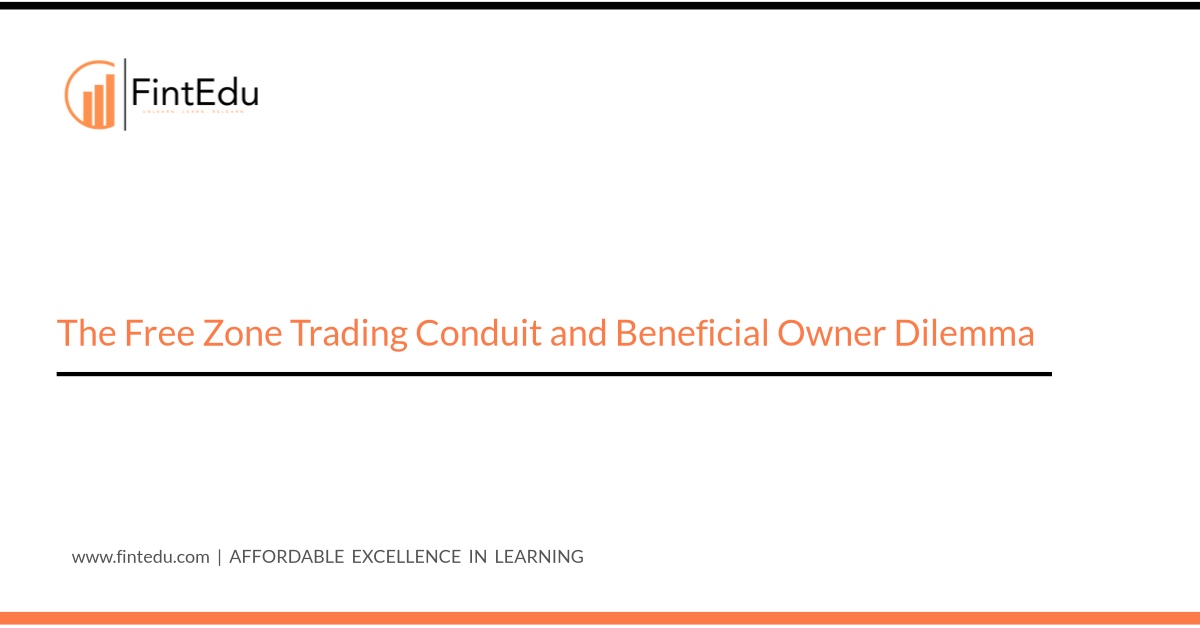LISTEN TO THIS ARTICLE

Background: A Free Zone Trading Company in the UAE
Galaxy Trading FZCO is a goods trading company based in a UAE Free Zone (Jebel Ali). The company, led by CEO Khalid and trading manager Ahmed, imports consumer electronics and distributes them across the Middle East. Being a Free Zone Person, Galaxy Trading enjoys a 0% corporate tax rate on profits if it qualifies as a Qualifying Free Zone Person (QFZP). To maintain QFZP status, it must meet several conditions – notably deriving only Qualifying Income (or only a very small portion of other income) and having adequate substance in the Free Zone. Galaxy’s finance manager, Fatima, is tasked with ensuring the company stays within these tax rules.
Key Characters:
- Khalid – CEO of Galaxy Trading FZCO, keen on expanding business while retaining tax benefits.
- Ahmed – Trading Manager at Galaxy, handles sales deals and customer relationships.
- Fatima – CFO of Galaxy, responsible for compliance with the new corporate tax regime.
- Ravi – External tax consultant engaged to advise on Corporate Tax and Free Zone regulations.
The Big Deal and a Questionable Arrangement
In mid-2025, Ahmed secures a large order of high-end electronics worth AED 10 million. The buyer is SunLite Stores, a major retail chain on the UAE mainland (a Non-Free Zone Person). This is Galaxy’s first substantial local UAE sale. Khalid is excited, but Fatima is cautious – income from transactions with mainland customers can be taxable at 9% unless carefully structured under Qualifying Income rules. Under Cabinet Decision No. 100 of 2023, Free Zone companies can still earn 0% tax on some mainland transactions, but only if the income is derived from approved Qualifying Activities and not from any disallowed (excluded) activities. In Galaxy’s case, trading electronics could qualify (distribution of goods from a designated zone is a permitted activity), but it requires strict adherence to the rules.
To preserve the 0% tax benefit on this big sale, Ahmed proposes a workaround: instead of invoicing the mainland buyer directly, Galaxy will sell the electronics to StarTech LLC, a small company owned by a friend and registered in another Free Zone (DMCC). StarTech would act as a reseller, immediately delivering the goods to SunLite Stores in Dubai. “On paper, it’s Free Zone-to-Free Zone,” Ahmed explains, “so it should count as Qualifying Income at 0% tax.” The team proceeds with this plan: Galaxy ships the electronics directly to SunLite’s warehouse, but invoices StarTech (the DMCC Free Zone company). StarTech takes a nominal margin and then invoices the mainland retailer, completing the loop.
Uncovering the Beneficial Ownership Issue
A few weeks later, as Fatima prepares Galaxy’s accounts, she notices a red flag. The entire AED 10 million revenue was recognized as a sale to StarTech (a Free Zone Person), which they assumed was tax-free Qualifying Income. However, Fatima recalls recent tax guidance about “Beneficial Recipient” requirements for Free Zone transactions. Upon investigating the delivery documents, she confirms the goods never even stopped at StarTech, they were delivered straight to SunLite Stores (the mainland customer). Essentially, StarTech was just a pass-through. Fatima grows concerned that Galaxy has unknowingly been used as a conduit, which might jeopardize their QFZP status.
Fatima consults Ravi, the tax advisor, to clarify the rules. Ravi points out a crucial condition in the Free Zone Corporate Tax regime: when a QFZP sells to another Free Zone Person, i.e. the purchaser must be the “Beneficial Recipient” of the goods or services. The Beneficial Recipient is defined as the person who has the right to use and enjoy those goods or services, without any obligation to pass them on to someone else. “This rule is an anti-avoidance measure,” Ravi explains. “It ensures the 0% rate only applies if the Free Zone buyer is the true end-user, not just an intermediary for a mainland entity.”
In Galaxy’s case, StarTech was not the true end-user; SunLite Stores was. StarTech had a contractual obligation to pass on the goods (they were essentially reselling immediately). Therefore, StarTech is not the Beneficial Recipient, SunLite is. This means Galaxy’s AED 10m sale cannot be treated as income from a Free Zone Person for tax purposes, despite the invoice. Instead, that revenue is effectively treated as if Galaxy sold to a Non-Free Zone person (a mainland company) via a conduit arrangement. In short, the transaction fails the Beneficial Recipient test, Galaxy used a Free Zone-to-Free Zone invoice, but the end-beneficiary was outside the Free Zone, so the income is disqualified from the 0% regime.
Tax Consultant (Ravi): “Galaxy must look through the arrangement. According to Article 3 of Cabinet Decision 100 of 2023, if the Free Zone buyer is just a middleman, the third-party end customer is considered the Beneficial Recipient. The sale won’t count as Qualifying Income because a conduit or intermediary will not pass the test. For Galaxy, that AED 10 million is treated as non-qualifying revenue, essentially a mainland transaction in the eyes of the law.”
Ahmed and Khalid are taken aback. They genuinely thought using a Free Zone intermediary kept the income tax-free. Ravi continues to outline the implications:
- Misrepresentation Risk: If Galaxy had obtained a statement from StarTech claiming it was the Beneficial Recipient, that statement would be false given the goods went straight to SunLite. Relying on such misrepresentation is risky. (Tax guidance allows a seller to obtain a written undertaking from the buyer confirming they are the Beneficial Recipient and will use the goods in their own Free Zone business. But this is invalid if the seller has reason to believe the goods are actually destined for someone else, which was clear from the delivery to SunLite.) In this scenario, Galaxy did not seek any confirmation from StarTech. Had they done so, both parties might have been knowingly misrepresenting the facts, which could lead to compliance penalties.
- Qualifying Income Impact: Galaxy’s other revenue for the year includes AED 90 million from exports and Free Zone clients (clearly Qualifying Income). The AED 10 million from this SunLite deal, however, is non-Qualifying Income because it was ultimately a sale to a mainland entity via a conduit. Non-Qualifying Income is taxed at 9% for a QFZP. That alone is a tax cost Fatima hadn’t budgeted for. But an even bigger problem looms: the volume of non-qualifying revenue relative to total revenue.
Tax Risk: Breaching the De Minimis Threshold
Under the UAE’s Free Zone tax rules, a QFZP is allowed to earn a small amount of non-qualifying income without losing its 0% status on the rest. This is the de minimis rule, which permits an incidental portion of revenue to fall outside the qualifying scope. The threshold is 5% of total revenue or AED 5,000,000, whichever is lower. If non-qualifying revenue stays under this limit, the company remains a QFZP (only the non-qualifying portion would be taxed 9%). But if the threshold is exceeded, the Free Zone Person loses QFZP status entirely.
Fatima quickly does the math: AED 10 million non-qualifying on AED 100 million total revenue = 10%. This exceeds the 5% de minimis limit by a wide margin. As Ravi confirms, this breach would disqualify Galaxy Trading as a QFZP for the tax period. In fact, according to the Corporate Tax Law and decisions, if a Free Zone company fails the QFZP conditions during a year, it is treated as a normal taxpayer from the start of that year, meaning all its income becomes taxable at 9%. The consequences don’t end there: the latest FTA guidance indicates that if QFZP status is lost due to a de minimis breach, the company could be barred from regaining the 0% rate for several years(the current guidance suggests the loss of status applies for the current year plus the next four years). This is a devastating scenario for Galaxy, a tax cost on all profits now, and no Free Zone tax benefit for years to come.
Khalid realizes the gravity: by using the Free Zone company as a conduit for a mainland transaction, they not only generated a taxable profit chunk, but also nearly tripped a wire that would make their entire business taxable at 9%. The very Free Zone incentive they relied on was at risk.
Damage Control: Identifying and Rectifying the Issue
Galaxy’s leadership convenes an urgent meeting with Ravi to find a solution. The goal is clear, retain QFZP status by bringing the non-qualifying revenue within the allowed limit, and fix any procedural lapses.
Step 1: Quantify and Segregate Revenues. Fatima and Ravi segregate Galaxy’s revenue into qualifying vs. non-qualifying components for the current financial period. The total revenue is AED 100 million. Non-qualifying revenue comprises the AED 10 million SunLite/StarTech deal. All other sales (to foreign clients and to other Free Zone companies where those companies were end-users) are qualifying. The non-qualifying portion is 10%, clearly above the 5% threshold.
They realize there are two ways to mitigate the breach: increase qualifying revenue or reduce the non-qualifying revenue recognized in this period. Time is short, the tax period ends in a month.
Step 2: Operational Fix – Adjusting the Transaction Timing. Galaxy decides to renegotiate the delivery schedule with SunLite Stores. Fortunately, the contract allowed for split deliveries. Galaxy informs SunLite that to ensure smooth logistics, they will deliver and invoice 25% of the order (AED 2.5 million worth of goods) after the New Year (just a few weeks delay). SunLite, eager to maintain a good relationship and facing no shortage of inventory, agrees to the split delivery. This effectively moves AED 7.5 million of the sale into the next tax period. For the current period, Galaxy’s books will only show AED 2.5 million sale (via StarTech) related to SunLite. This reduces the non-qualifying revenue in the current year to AED 2.5 million, which is below 5% of the revised total (now AED 92.5 million current-year revenue). They have effectively met the de minimis threshold – staying at the maximum allowed 5%. It’s a tight save, but it means Galaxy just remains a QFZP for the year.
Step 3: Compliance and Documentation. To fortify their position, Galaxy documents the rationale for the split delivery and ensures proper invoices align with the new schedule. Fatima prepares a detailed internal memo explaining that the StarTech transaction.
Step 4: Future-Proofing the Business Model. Beyond just salvaging the current year, Galaxy overhauls its approach to prevent a repeat scare:
- No More Conduit Arrangements: Khalid issues a policy that Free Zone-to-Free Zone sales will only be done when the Free Zone buyer is the true end-user. If there’s any indication a Free Zone customer is purchasing on behalf of a mainland client (for example, delivery requests to a third party, or the buyer lacks capacity to use the goods themselves), Galaxy will treat the sale as a mainland transaction from the start. The team now understands that routing sales through a Free Zone entity doesn’t legitimize them as Qualifying Income if the end customer is outside the Free Zone.
- Beneficial Recipient Declarations: Galaxy will obtain written confirmations from Free Zone customers stating they are the Beneficial Recipients of the goods and will use them for their own business in the Free Zone. This paperwork will be standard for all inter-Free Zone deals. If a customer cannot honestly sign such a statement, that’s a red flag – meaning the transaction likely involves onward supply. In such cases, Galaxy can decide either to refrain from the deal or to proceed knowing it will be treated as non-qualifying (and then ensure those remain under 5% of revenue).
- Mainland Branch for Local Sales: On Ravi’s advice, Galaxy considers setting up a mainland UAE subsidiary or branch to handle sizable domestic orders. For future big orders from companies like SunLite Stores, the mainland branch could directly purchase from Galaxy FZCO or import the goods itself. Galaxy FZCO would then record only an arm’s length transfer price for that sale to the branch. This way, the bulk of profit from UAE onshore sales would be taxed in the mainland entity at 9%, but Galaxy FZCO’s own books would show minimal (or no) non-qualifying revenue, preserving its QFZP status for its core Free Zone operations. (They understand the transfer pricing must be at arm’s length, Galaxy can’t just give goods free to the branch, but they can structure margins such that the Free Zone entity’s profit on local deals is small enough to stay under the threshold.) Though setting up a mainland branch means giving up 0% tax on those local profits, it provides clarity and protects the larger 0% tax benefit on Galaxy’s export business.
- Monitoring and Training: Fatima establishes a quarterly review process of revenue sources. The finance team will categorize each sale as qualifying or non-qualifying in real time, to ensure they never unknowingly creep over the 5% limit. Ahmed and the sales team receive training on these concepts so they appreciate, for instance, why a lucrative deal might be structured differently for tax compliance. They learn the mantra: “It’s not just who we invoice, but who actually benefits, that matters.” Any unusual deal (such as involving third-party delivery or an unfamiliar intermediary) must be vetted by finance or tax advisors before execution.
Lessons Learned
By the end of the case, Galaxy Trading FZCO narrowly retains its Qualifying Free Zone Person status. The company files its corporate tax return reporting two categories of income: AED 95 million as Qualifying Income at 0% and AED 5 million as Taxable Income at 9%, clearly disclosing the mainland portion. Thanks to proactive adjustments, they remained within the allowed 5% non-qualifying revenue limit and avoided a multi-year disqualification. The management now fully understands how beneficial ownership and qualifying income classification impact their tax status:
- A Free Zone company cannot simply act as a booking center for non-Free Zone businesses without consequences. Using a Free Zone entity as a conduit for onshore trade puts its tax benefits at risk. Galaxy’s attempt to route a sale through StarTech (DMCC) backfired because the Cabinet Decision No. 100 of 2023 makes it clear that transactions only count as Free Zone-to-Free Zone (0% taxable) if the Free Zone buyer is the genuine end user. In this case, the end user was a mainland company, disqualifying the income from the 0% regime.
- The Beneficial Recipient test is now ingrained in Galaxy’s deal evaluations. They will ensure the “Beneficial Recipient” (the party enjoying the goods/services) is considered for every sale. If the Beneficial Recipient is a mainland entity, that income is treated as coming from a Non-Free Zone Person and potentially taxable at 9% or counted toward the non-qualifying quota. This affects how they structure contracts with Free Zone customers and document deliveries.
- The de minimis rule serves as a safety valve but also a tripwire. It allowed Galaxy to have a small portion of non-qualifying revenue without losing all benefits, but breaching it would have triggered full taxation on all income. Galaxy learned to monitor this closely. They were fortunate to catch the issue with enough time to react, in the future, they plan to avoid coming near the threshold at all if possible.
- Rectification and Compliance: In case an issue arises, promptly addressing it (e.g. adjusting transaction timing or voluntarily paying tax on a portion) can save the day. Galaxy’s honest reporting and corrective actions not only avoided a punitive outcome but also demonstrate good faith to the tax authorities. The company now has a more robust structure, including possibly a mainland arm for local sales, that aligns with the Free Zone rules. This way, they can continue their Free Zone operations (like exports and Free Zone-to-Free Zone sales where appropriate) with confidence that they won’t inadvertently lose their 0% tax incentive.
Through this fictional but realistic scenario, we see how a UAE Free Zone trading company must carefully navigate beneficial ownership rules and the definition of Qualifying Income. The characters’ experience highlights the importance of not using a Free Zone entity as a mere shell or intermediary for others’ business. By understanding the regulations (such as Cabinet Decision No. 100 of 2023 and related decisions) and taking prompt corrective measures, Galaxy Trading FZCO manages to stay compliant and retain its QFZP status, keeping its tax incentive intact while continuing to grow its goods trading business in the UAE.
Disclaimer: Content posted is for informational and knowledge sharing purposes only, and is not intended to be a substitute for professional advice related to tax, finance or accounting. The view/interpretation of the publisher is based on the available Law, guidelines and information. Each reader should take due professional care before you act after reading the contents of that article/post. No warranty whatsoever is made that any of the articles are accurate and is not intended to provide, and should not be relied on for tax or accounting advice.Contributor
Related Posts

The Growing Importance of Corporate Service Providers Corporate Service Providers (CSPs) play a key ...
Read More
The UAE has introduced a new top-up tax regime as part of its commitment to global tax reforms und...
Read More
Qatar, 05 January, 2026: The General Tax Authority (GTA) has announced that the tax return f...
Read More